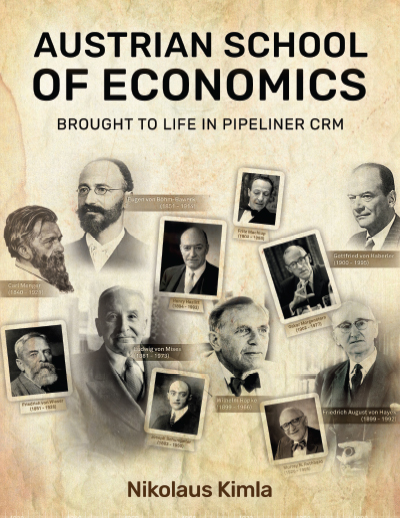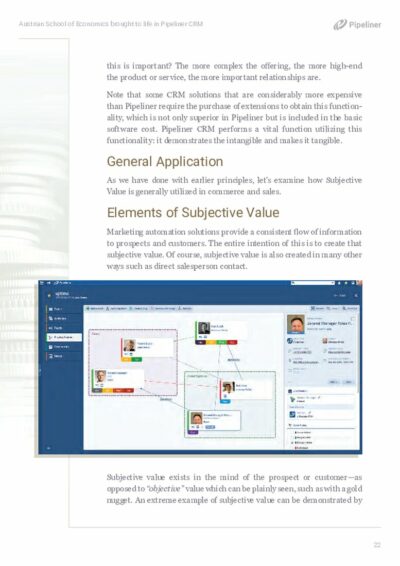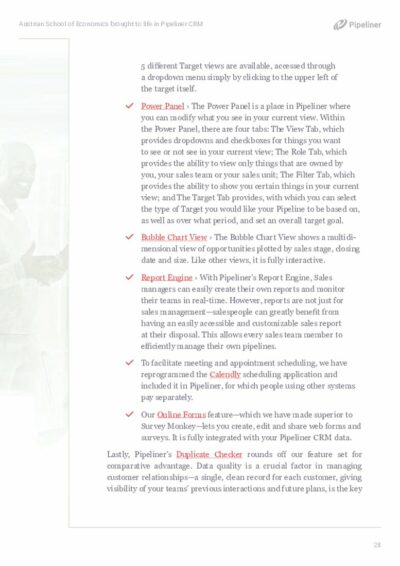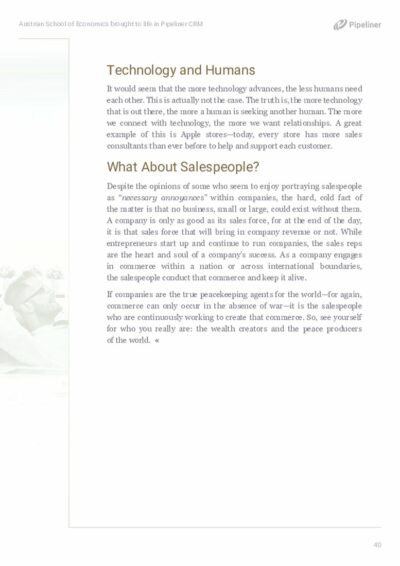
Austrian School of Economics – Brought to Life in Pipeliner CRM
Prime Economic Principles in Pipeliner CRM
Sales isn’t just about knowing your productProduct Product refers to anything (an idea, item, service, process or information) that meets a need or a desire and is offered to a market, usually but not always at a price. and customers—it’s also about understanding the economic forces that shape every deal. Sunk costs, opportunity cost, subjective value, and comparative advantage all play a role in whether a sale is profitable or a loss. This book breaks down these key principles in a way that’s easy to apply, helping you make smarter sales decisions. And with Pipeliner CRM, these concepts aren’t just theory—they’re built into the platform, empowering sales teams with real-time insights, automation, and strategic decision-making tools.
Principle 1: Avoiding Sales Risk with Sunk Costs
Sunk costs are the time, money, and effort already invested in a deal. The challenge? Knowing when to cut losses and move on. Pipeliner CRM helps sales teams track buyerBuyer A buyer is an individual or organizational entity that purchases a product or subscribes to a service. engagementEngagement Engagement is the state or process of keeping a specific class of audience (employees, management, customers, etc.) interested about a company or brand and invested in its success because of its perceived relevance and benefits to the audience. and past opportunities, providing clear signals on when to push forward and when to walk away
Principle 2: Know Your Opportunity Cost!
Every sales decision comes at the cost of another opportunity. If a deal isn’t profitable, it may be better to invest resources elsewhere. Pipeliner CRM helps sales teams analyze true opportunity costs, ensuring every deal contributes to the bottom line.
Principle 3: Understanding Subjective Value in Sales
Customers perceive value differently based on their unique needs. Understanding subjective value allows sales teams to position their product effectively. Pipeliner CRM provides insights into each buyer’s perspective, helping salespeople craft more compelling pitches.
Principle 4: Sales Management and Comparative Advantage
Not every salesperson excels in every area. Comparative advantage means leveraging individual strengths to maximize team efficiency. Pipeliner CRM helps managers identify who performs best in different sales stages, allowing for strategic delegation.
Principle 5: Sustainable Value = Sales Success
Winning a deal is just the beginning. True success comes from delivering ongoing value, leading to repeat business and customerCustomer Customer is an individual or an organization that purchases a product or signs up for a service offered by a business. loyalty. Pipeliner CRM features like AccountAccount Account refers to a record of primary and background information about an individual or corporate customer, including contact data, preferred services, and transactions with your company. Health and Automatizer help businesses build lasting relationships and increase retention.
Afterword 1: Why Salespeople Matter
This book draws from the Austrian School of Economics, emphasizing individual decision-making, free markets, and subjective value. Thinkers like Menger, Mises, and Hayek shaped these principles, which still influence modern sales strategies today.
Afterword 2: The Austrian School of Economics
This book’s ideas come from the Austrian School of Economics. Thinkers like Carl Menger, Ludwig von Mises, and Friedrich August von Hayek shaped this approach. They emphasized individual choices, subjective value, and free markets. The Austrian School also stresses that economic freedom comes with responsibility.
Learn More About Pipeliner CRM
Take a no-obligation 14 day trial of Pipeliner CRM.
No credit card info required – just experience for yourself how it could impact your sales.
Additional Resources
This ebook is on the subject of “Win Together.” It falls under the same context as“win-to-win” described in my book Network Selling: Guarantee Success for the Digital Age. Today, this aspect of sales is more important than ever, and must also be part and parcel of CRM solutions.
“For some years I’ve been saying that, as a society, we’re in the midst of a transformation. Given what’s happened in the last couple of years, there’s no one left who is disagreeing with me! It’s become very obvious.”
 Nikolaus Kimla, CEO at Pipelinersales, Inc.
Nikolaus Kimla, CEO at Pipelinersales, Inc.A common term in sales today is EQ, which stands for “emotional I.Q.” It means the skill a salesperson has in reading emotions and utilizing them in sales. It means empathy and a number of other abilities. The short version is, it’s an I.Q. when it comes to emotions. But just as with our Network Selling model, E.Q. isn’t just for sales, either. It’s actually the missing factor in human interactions, for confrontation—a common “tool” in human interactions—doesn’t actually handle anything.
“You can have everything in life you want if you will just help enough other people get what they want.”
 Zig Ziglar
Zig Ziglar






